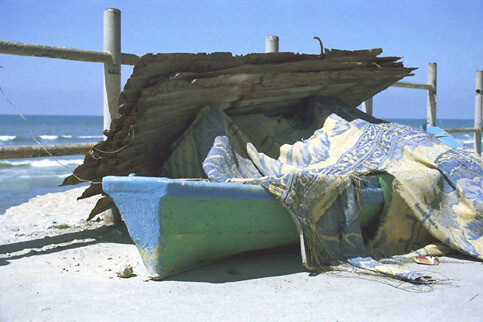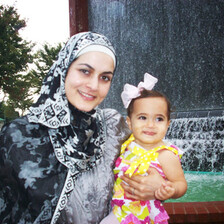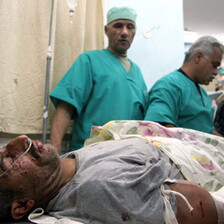Al Jazeera 2 August 2005

Gaza fishermen are restricted from accessing the southern coastline, adjacent to the Gush Katif bloc of settlements, and can only fish within a 10-km in-sea zone. (Helga Tawil)
Though one of Gaza’s oldest active fishermen, Suheil Sa’dallah spends most of his time loitering around Gaza’s makeshift fisherman’s port, where dozens of docked boats, including his own, bob gently in the sea. In the face of stringent Israeli restrictions on Palestinian fishing zones, and the absence of a modern industrial port, many fishermen there, like Sa’dallah, can no longer make a living. He talks about the days their catches exceeded 700kg a day “of every fish your heart desires”, when the only limit on fishing zones were as far as the eye could see.
A new port would mean better equipment, modern storage facilities for importing and exporting fish, and assuming Israeli restrictions are lifted, improved catches. An agreement to build the port was reached between the two sides on 21 September 2000, one week before the eruption of the second intifada.
Israel has since frozen the project. The land that was set aside for it is now a cabbage farm not far from the Netzarim settlement, set to be evacuated beginning 15 August. The Israelis have given initial approval for construction to resume after the evacuation of settlements and troops from Gaza, but as with most issues related to post-disengagement coordination, nothing has been officially agreed upon.
“The Israelis have agreed to the construction. The Oslo Accord, after all, gave us that right. But beyond a general statement, we have nothing. They don’t give us clear answers when we try to discuss details with them,” says Mohammad Samhouri, general coordinator of the Palestinian technical committee following withdrawal.
Top priority
The European Union has said it is willing to invest up to half a billion dollars in Gaza after disengagement. The port is their “priority of priorities”, according to Seamus Dunne, senior social development officer for the EU’s International Management Group. He says the port would include facilities for medium-sized boats that would allow export of fish to as far as Cyprus and Italy.
“The EU is extremely interested in the fisherman’s port because it’s a small investment with big potential. It could be operational in as little as six months, for about $15 million, and will create a host of employment opportunities for Palestinians,” Dunne said. “But whether [Israel] will continue to search and harass fishermen at sea, I cannot say.”
Gaza fishermen are restricted from accessing the southern coastline, adjacent to the Gush Katif bloc of settlements, and can only fish within a 10-km in-sea zone. In addition, the fishermen say they face harassment from Israeli navy vessels. “We are regularly shot at, ordered to strip down, to jump overboard. We’ve had cold water thrown on us, our boats have been damaged, and many of us have been imprisoned,” said Sa’dallah, his colleagues confirming the incidents with collective nods.
Israeli control
Dunne says a port will be useless if Israeli restrictions on Palestinians exports are not removed. “We have to be realistic. The whole export structure is under Israeli control. They can even go so far as to force nations to stop buying Palestinian goods.
“Israeli exporters often delay the exit of Palestinian products. The Palestinians need to have their own points of exit - whether this is a sea port or an airport,” he said. “Politically, pressure must come from the Quartet to resolve this issue,” Dunne said, referring to the group made up of the United Nations, European Union, United States and Russia trying to negotiate a Palestinian-Israeli peace deal through a road map they drew up in 2003.
Without the freedom to export freely, all the fish in the sea are worthless to Palestinians, Samhouri said. “If they are not delivered on time, if they are stuck for days at Karni, if there is not free access to Israel or outside markets, they will not add value to us.”
Palestinian officials have made the issue of access their mantra in recent weeks. A June 2004 report published by the World Bank warned that if the Israeli closure policy was not changed, the Palestinian economy would not revive, and poverty and alienation would deepen. Israel controls all access points to the impoverished strip of 1.5 million people.
Agricultural assets
It is not clear whether that will change after Israeli Prime Minister Ariel Sharon’s planned pullout from Gaza this month. According to the original plan, Israel will maintain control over Gaza’s air, sea and land space.
Salah Abdel Shafi, an economic consultant for the Palestinian Authority (PA), says the problem of access applies equally to agricultural assets, such as greenhouses, that may be left behind in the evacuated settlements. “There is exaggeration on the issue of assets and the ability to take advantage of them. Right now, there are about 13,000 greenhouses in Gaza.
“Sixty per cent of their production cannot be marketed due to the Israeli closure regime. Adding another 4000 [greenhouses] from the settlements will only be a burden, unless Israel facilitates the export of the products,” he said.
“If the access issue is not resolved, if they turn Gaza into a large prison, it will be a disaster, and disengagement will not lead to economic recovery. That’s why most of the coordination going on has to do with the ports.” The PA is calling for modern screening techniques that will make passage of goods more efficient and secure to satisfy the needs of both sides.
Modern security checks
At the Karni industrial crossing with Israel, the PA seeks to replace the “back-to-back” system of export with a “door-to-door” system, says Abdel Shafi. In the back-to-back system, goods must be reloaded from one truck to another on the Israeli side after a series of security checks. Many perishable items such as dairy products and fish spoil in the process.
The EU has proposed a modern system of security checks. Goods would be transported in sealed containers embedded with traceable electronic chips. The system would allow products to be delivered quickly and securely to their destinations.
As with everything related to post-disengagement coordination, however, there has only been agreement “in principle”, says Abdel Shafi. “In principle, the Israelis have agreed to change the system. But once you get into the details - and the Israelis kill you in the details - it’s a different story.”
In the meantime, Sa’dallah and his fellow fishermen say all they can do is pray for better times. “I hope things will change. It’s all in God’s hands. But really, I am not optimistic.”
Laila M. El-Haddad is a journalist based in the Gaza Strip. This article was originally published by aljazeera.net and reprinted on EI permission.
Related Links




